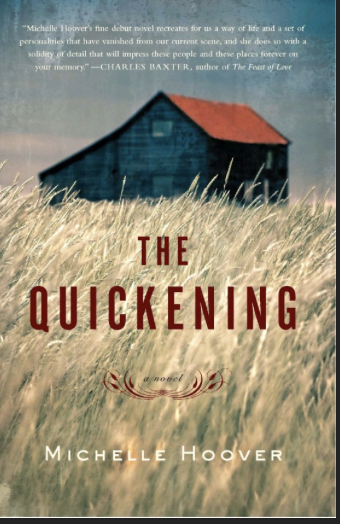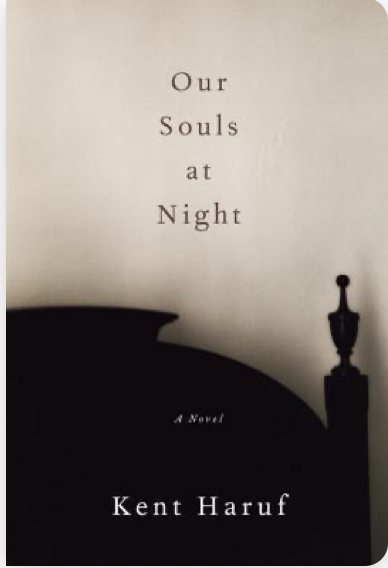
Recent Reviews

The Quickening
‘The Quickening’ was hard to put down. Michelle Hoover’s lyrical writing, compelling characters, and dramatic setting create a palpable tension. It is a story about two families struggling to survive on the isolated Midwest plains. As the families begin to rely on one another, mutual resentments accumulate. Using language as sparse as the plains, Hoover’s emotionally charged novel transports us to a time, place, and dialect that no longer exists.
In 1913 Mary Morrow walked the mile to meet her new neighbor. She longed for a friend. She had been raised in a city. It was where she met her abusive husband, Jack. On this vast prairie, only one friendship option exists. Her name is Edinan Current. Edina and Mary’s temperaments couldn’t be different. Edinan is content farming alone or with her gentle husband, Frank. Except for a church that plays a part in the story, these folks could be living on the moon. The book explores Edwina and Mary’s internal worlds and reveals their different fortitudes, attitudes, and character. Life proceeds over the years, and they help one another through miscarriages, hurt children, sick animals, failed crops, the Great Depression, a fire, encroaching poverty, and more isolation. Edinia and Mary have secrets; some are known to the other but never acknowledged. These families are intertwined not out of mutual admiration but by circumstance. Eventually, betrayal rears its ugly head. These two women make decisions that affect their families and the next generation.
The book is an homage to the families that farmed in isolation their 180 acres thanks to the Homestead Act. Feelings are not shared. People are tight-lipped and private. Hoover’s use of metaphors, simile, and allegories are breathtaking. Words are not wasted, and meaning exists in the words not written. This powerful story is about the emotional toll of hard work and heartache on two farmwives and their families as they toil on the Midwest plains. 4.5/5

Our Souls at Night by Kent Haruf
‘Our Souls at Night’ by Kent Haruf is a tender and touching novel. I love the book’s title and the implied double meaning. Like Haruf’s other five first-rate novels, this story occurs in the small fictitious town of Holt, Colorado. It is a beautiful meditation on the emotional isolation of aging. Haruf’s writing is intimate while reserved and simple, while nuanced.
The book’s plot is straightforward. Widow Addie Moore knocks on the door of her widower neighbor Louis Waters. Addie says to Louis, “I wonder if you would consider coming to my house sometimes to sleep with me. I mean we’re both alone. We’ve been by ourselves for too long. For years, I’m lonely. I think you might be too.” Addie’s bold proposal is not about sex, but rather a hope for companionship. Addie and Lucas are in their 70s and keenly aware that they have fewer years ahead of them than behind. Loneliness has been a constant companion since their spouses died and their children moved away.
The next day Louis calls Addie, “I’d like to come over tonight if that is still alright.”
And the story of Addie and Lucas’ adventure begins.
Night after night, they lay next to one another sharing the stories of their lives. The joys and delights, the mistakes and regrets. They discuss their deceased spouses, careers, grown children, and Addie’s grandson. They are not interested in what their lives have meant in a larger existential way. Rather the dynamic between Lucas and Addie initially feels like a therapist and a patient or a clergy member and a parishioner. Addie and Lucas don’t apologize or analyze their pasts. They do not express their regrets in teary confessions of self-flagellation, but rather they state the truths of their lives. And the sharing of their souls becomes healing because there is no judgment. Lucas and Addie respond to each other’s stories with empathy.
It is not all smooth sailing. Unresolved dynamics with adult children emerge and petty small-town gossip grows. Nonetheless, Addie and Lucas grow fond of one another and even come to love one another. Their connection is both ordinary and sacred.
This book is about grace, tenderness, vulnerability, and maybe even forgiveness. Most important, their companionship makes them happy. I wish the ending were different, but it is probably realistic. Kent Haruf died in Nov. 2014. His writing about the human condition will be missed. Though I appreciated all his books, the love, and grace in ‘Our Souls at Night’ makes this novel my favorite.

The Sweetness of Water
‘The Sweetness of Water’ by Nathan Harris is an erudite depiction of a small Georgian town turned upside down after the Civil War. In the fictitious town of Old Ox, the white community viciously resists slavery’s end. Without dismantling oppressive social structures, the freedom of former slaves was limited; the seeds of Jim Crow were planted. The dialogue between the characters is filled with palpable tension and glimpses of hope. ‘The Sweetness of Water’ was on the 2021 Booker Prize Long List, President Obama’s 2021 Favorite Book List as well as Oprah’s Book Club selection for June 2021. A gifted writer, Nathan Harris was only 29 years old when this book was published!
George Walker is the primary protagonist. Born in the North, he never embraced the culture of the South. He and his wife Isabelle live on a farm on the outskirts of a fictitious town called Old Ox. The Civil War has ended, and they believe their son Caleb, who fought for the confederacy, is dead. They are bereft. One day, George encounters two former slaves named Landry and Prentiss. The brothers have fled the cruel plantation adjacent to the Walker farm and begun walking toward a new life. What that life will look like, they are not sure. When asked about their plans, Prentiss says, “It’s just nice. To be left alone for a time.” He also states that they want to find their mother, who had been sold. When George offers to pay the brothers a fair wage to help him farm his land, they accept. They will need money for their upcoming journey.
Miraculously, George and Isabelle’s son Caleb is alive and returns home. He joins his father, Landry, and Prentiss, in farming the land. When the townspeople hear that two black men and two white men are working side by side, they are enraged. They feel the Walkers have betrayed the existing social order. Though initially, the townspeople show perfunctory politeness toward the Walkers, there is smoldering resentment.
Like our current times, the people of Old Ox cling to the social hierarchy that puts white men at the top and treats Blacks, gays, women, and other minorities cruelly and unjustly. When a crime is committed that involves the Walkers, the white community doubles down on their racist rhetoric and actions. They believe a price should be paid for white folks who treat Blacks as equals.
Other themes pulse through the story: Caleb’s homosexual relationship with his best friend, the intimacies and distance in the Walker marriage, and the dignity of the freed brothers who have endured so much suffering. Though fewer characters would have made the story a bit crisper, Harris’ writing is quiet, and effective.
The horrid injustices experienced by Black Americans persist 150 years after the Civil War. And though progress has been made, calls for an official apology have been met with hostility. A movement exists to erase the mention of slavery and racism from our history. As Harris states, “The present thunders on while the past is a wound untended, unstitched, felt but never healed.” His book can inspire us to acknowledge the past in order to move toward a better future. 4/5
